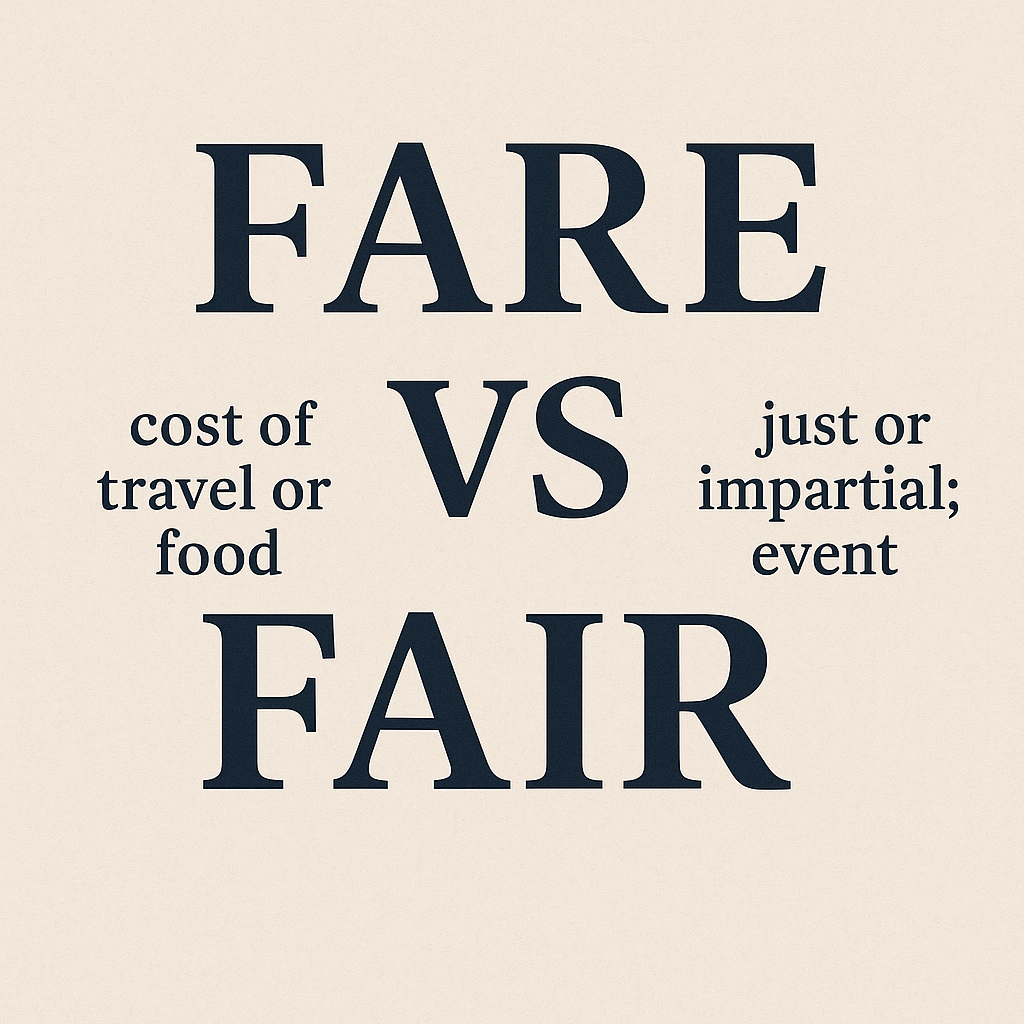Fare vs Fair

The English language is full of homophones words that sound the same but have different meanings and spellings. A classic example is fare vs fair. Though they may sound identical, their meanings and usage couldn’t be more different.
“Fare” usually refers to a cost of travel, a type of food, or how someone is doing. On the other hand, “fair” can mean just or impartial, light in color, or even a public event. Because of their identical pronunciation, it’s easy to mix them up when writing.
This article will help you clearly understand the difference between fare vs fair, explain their grammatical roles, provide real-life examples, highlight common mistakes, and give you simple memory tips to choose the right word every time.
Grammatical Explanation of Fare vs Fair
Fare vs fair involves homophones with different parts of speech and meanings:
- Fare is primarily a noun or verb:
- As a noun: it refers to the cost of travel or food.
Example: The taxi fare was expensive. - As a verb: it means to get along or do.
Example: How did you fare on the exam?
- As a noun: it refers to the cost of travel or food.
- Fair is usually an adjective, though it can also be a noun or adverb:
- As an adjective: it means just, impartial, or reasonable.
Example: That was a fair decision. - As a noun: it refers to a public festival or exhibition.
Example: We visited the science fair. - As an adjective (color): it describes light complexion or hair.
Example: She has fair skin.
- As an adjective: it means just, impartial, or reasonable.
Despite sounding the same, fare vs fair belong to different word categories and serve distinct functions in speech and writing.
Real-Life Examples of fare vs fair
Correct Usage of “Fare”:
- The bus fare increased last week.
- We enjoyed traditional fare at the local diner.
- He fared well during the interview.
Correct Usage of “Fair”:
- The referee made a fair call.
- Her fair hair glowed in the sunlight.
- We had so much fun at the state fair.
Incorrect Usage:
- She paid a high fair to travel. (Should be fare)
- The fare decision was applauded by all. (Should be fair)
- They fared to the amusement park last weekend. (Incorrect verb usage)
Using fare vs fair correctly ensures your writing makes sense and avoids unintended meaning.
Common Mistakes
Many English learners confuse fare vs fair due to their identical pronunciation, especially in writing.
One frequent mistake is using “fair” when referring to cost:
- Incorrect: I forgot to bring the fair for the bus.
- Correct: I forgot to bring the fare for the bus.
Another error is using “fare” to describe justice or equality:
- Incorrect: That’s not fare!
- Correct: That’s not fair!
Writers also confuse “fare” with “fair” in the context of events:
- Incorrect: Are you going to the food fare?
- Correct: Are you going to the food fair?
To avoid these errors, pay attention to meaning and context when writing fare vs fair.
For more grammatical tips in our blog
Memory Tips
Use these tips to remember fare vs fair:
- Fare = Fee or Food
Tip: “Fare” and “fee” both start with “f” — think travel costs.
Mnemonic: You “fare” well when you eat good “fare” (food). - Fair = Just or Festival
Tip: “Fair” has “air” in it — like “open-air” festivals.
Mnemonic: A “fair” judge gives a “fair” verdict at the “fair.”
Visualize:
- 🚌 Fare = transport or food.
- ⚖️ 🎡 Fair = justice, beauty, or an event.
Repeating these associations will help you avoid confusing fare vs fair, especially when writing quickly or under pressure.
Conclusion
The difference between fare and fair comes down to usage and meaning. Use “fare” when referring to travel costs, food, or progress. Use “fair” to describe equality, light color, or public events. They may sound the same, but context reveals their correct usage.
For more homophones and confusing word pairs, check out this list of commonly confused words from Grammarly.